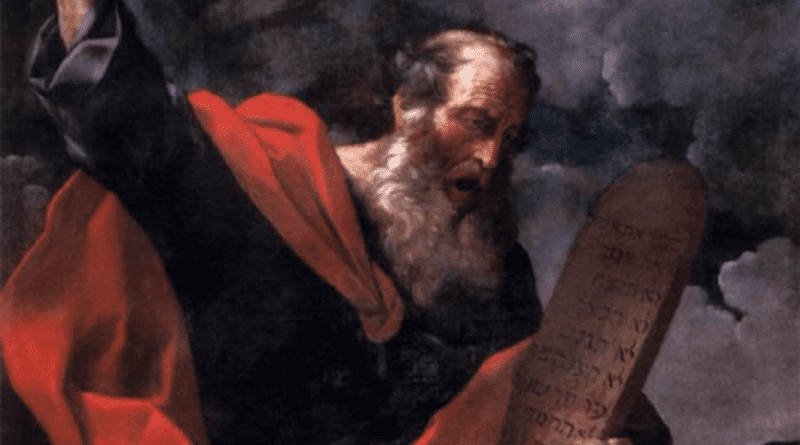Abrahamic Religions Each Share Their Own Decalogue – OpEd
People who simply want to put the Ten Commandments on the walls of our schools and our courtrooms often find themselves blocked by disagreements over which Ten Commandments to use.
The Decalogue, a central text of Judaism, appears in the Torah in Exodus and again in Deuteronomy, with wording that is not the same in the two books. The rabbis say that the two versions of the ten commandments correspond to the two sets of two stone tablets.
The version in Exodus was what was written on the first set of two tablets, which were broken by Prophet Moses after some Jews sinned with the Golden Calf. Deuteronomy repeats what was written on the second set of two tablets that God gave Moses.
Professor J. Cornelis de Vos points out, in an article that appeared on July 28, 2023, that Jewish Greek philosophy, the New Testament, Christian theology, Rabbinic Judaism, and the Church Fathers, all shaped and interpreted the Decalogue to meet the needs of their own community.
The Hebrew text in the Torah is fairly clear. “These words YHWH (God’s special name used by Jews) spoke with a loud voice to your whole assembly at the mountain, out of the fire, the cloud, the thick darkness, and he added no more. He (God) wrote them on two stone tablets and gave them to me (Prophet Moses) “. (Deuteronomy 5:22 )
Professor J. Cornelis de Vos adds that Philo of Alexandria, a Jewish Bible commentator and philosopher (20 B.C.E. – 50 C.E.), uses the Decalogue as headings under which he subsumes almost all of the commandments of the Torah. In a discussion of other examples of the number ten in biblical narrative, he writes: “But why note such examples as these, when the holy and divine law is summed up by Moses in precepts which are ten in all, statutes which are the general heads, embracing the vast multitude of particular laws, the roots, the sources, the perennial fountains of ordinances containing commandments positive and prohibitive for the profit of those who follow them?”
Philo was also the first to divide the Decalogue into two parts, reflecting piety and justice, respectively, which he considered to be the main virtues in ancient Judaism: “Further, the ten words on them, divine ordinances in the proper sense of the word, are divided equally into two sets of five, the former comprising duties to God, and the other duties to men.
“Philo (who was somewhat of a mystic) further claimed that the Decalogue, with its ten commandments, comprises the whole visible (space/time) world. He reasons that the world consists of (four dimensions) points, lines, surfaces, and solids, forms with 1, 2, 3, and 4 sides, respectively, and then notes that the sum of 1 + 2 + 3 + 4 is 10.
Four centuries later, Augustine of Hippo (354–430 C.E.) Christianized the Decalogue. Instead of dividing its contents equally across the two tablets, he argued the first tablet contained three commandments: 1. not to worship other gods or make idols; 2. not to misuse God’s name; and 3. to observe the Sabbath. These commandments symbolized the threefold nature of God as Father, Son, and Holy Spirit.
The remaining seven commandments on the second tablet related to human behavior towards fellow humans, with the prohibitions against coveting divided into two parts. This became the standard way that the commandments were enumerated in the Roman Catholic and Lutheran churches; but most Protestant Churches have a somewhat different division of the Decalogue which makes the Catholic single commandment not to worship other gods or make idols, into two separate commandments.
In the rare cases where the New Testament quotes specific laws from the Torah, it almost always quotes the Decalogue. For example, several parallel accounts depict Prophet Jesus citing the Decalogue in response to a question about what a person must do to gain eternal life in the next world.
Thus, when the question is posed by “a certain ruler,” Prophet Jesus replies (with only the human behavior tablet): “You know the commandments: ‘You shall not commit adultery. You shall not murder. You shall not steal. You shall not bear false witness. Honor your father and mother.'” (Luke 18:20)
Exodus tells us to “remember the Sabbath” while Deuteronomy tells us to “observe” it. More significantly, the purpose given in Exodus tells us to add holiness to God’s creation of the physical world; while Deuteronomy’s reason is grounded in social justice – to benefit all members of human society, including our own slaves.
Finally, emphasis is placed on these commandments in the Islamic faith: two sets of verses in the Quran, speak of them. The Quran speaks of them in chapter 6:151-153 and chapter 17:23-39 which is like a commentary on the commandments listed in 6:151-3. Some scholars call them the “verses of the ten commandments” simply because they speak of ten significant commandments to be observed by a Muslim. The Quran does not state that these are the same Ten Commandments that were given to Prophet Moses.

